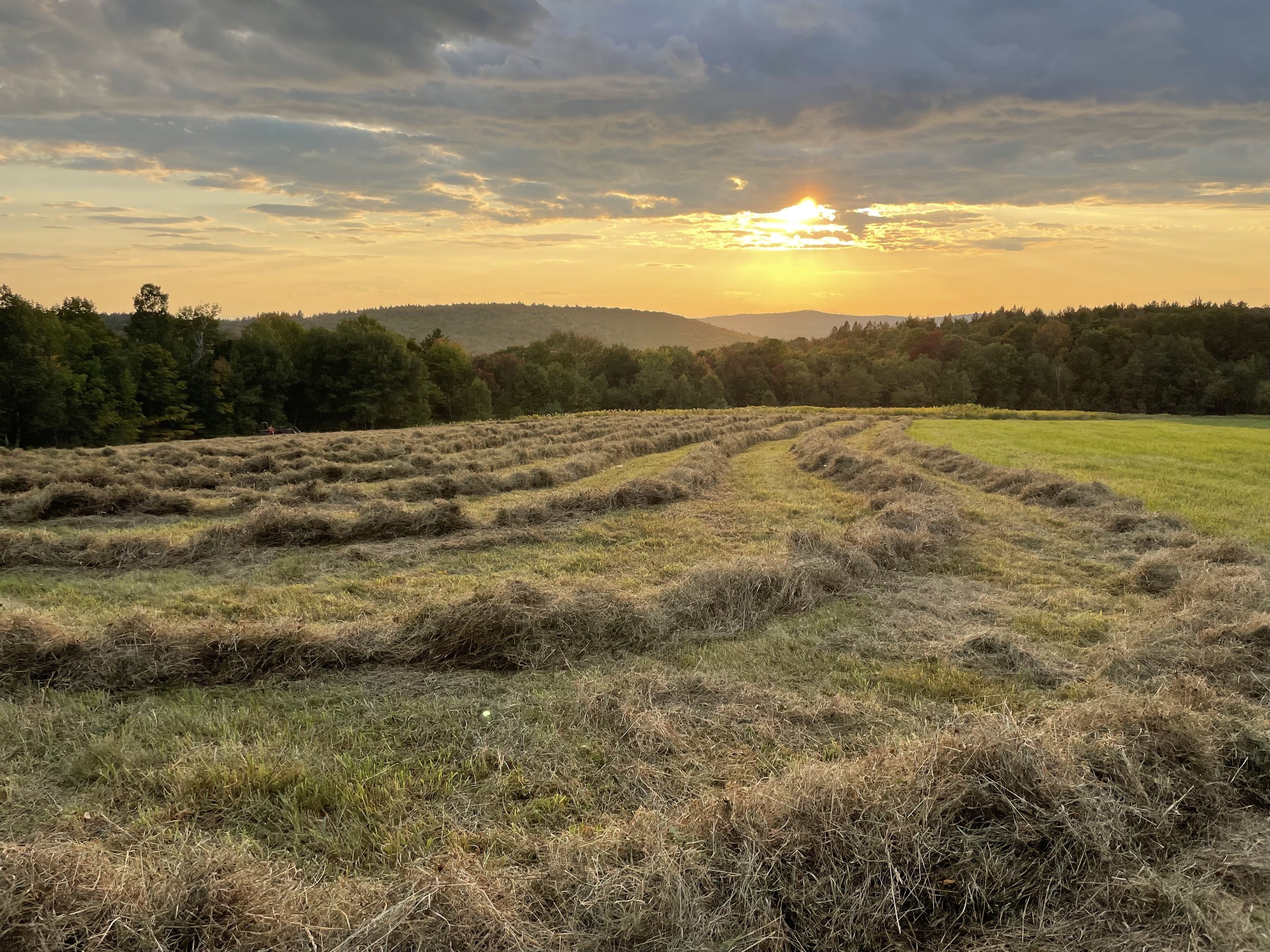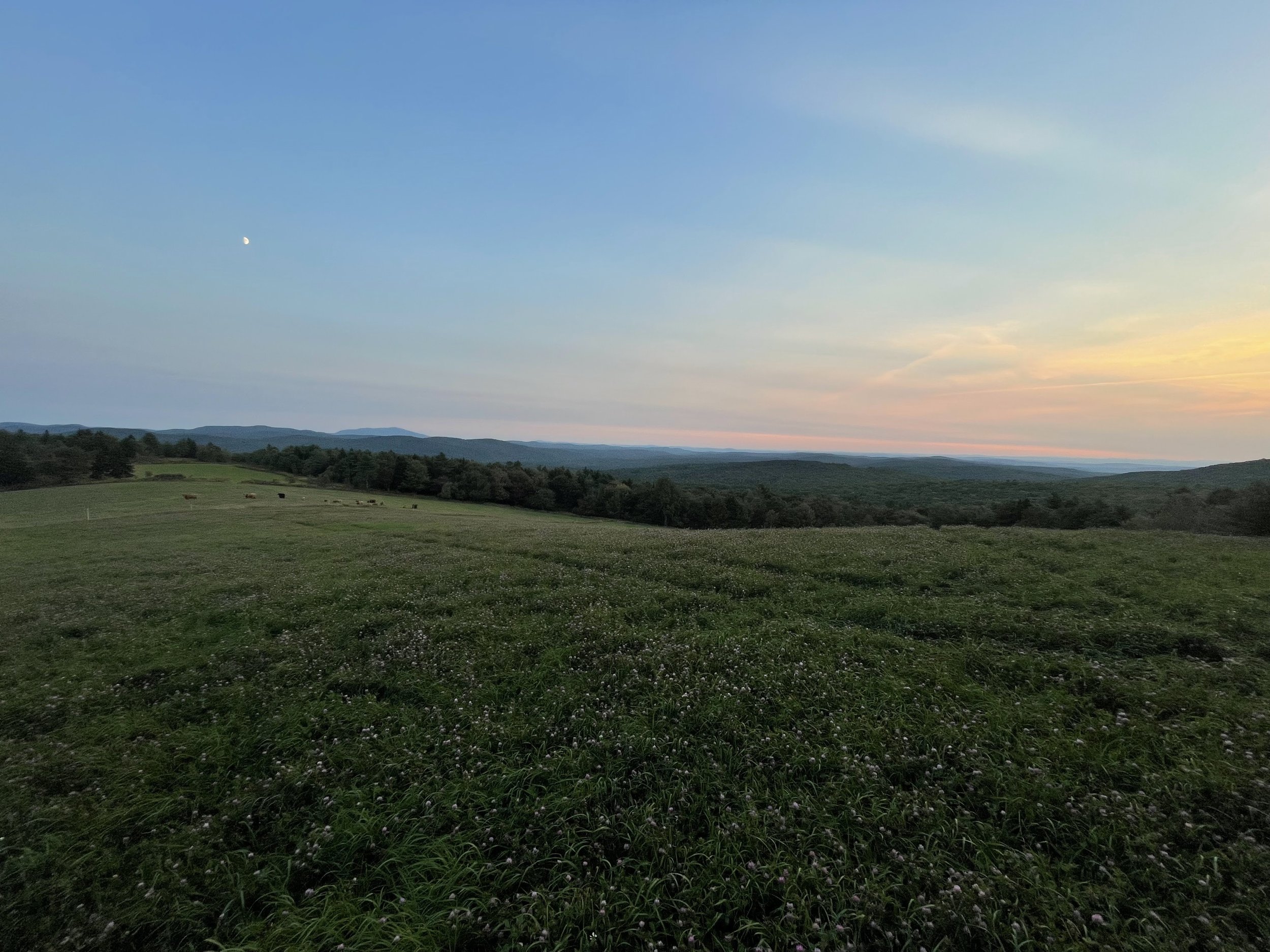
Welcome to
Pitcher Mountain Farm & Andorra Forest
Pitcher Mountain Farm, Home of Holistic Roots
In 2013, Yankee Farmer's Market, a Warner NH-based farm specializing in raising bison, leased a beautiful 220-acre section, expanding their operation by taking on Pitcher Mountain Farm in Stoddard, NH. The farm is part of a larger parcel know as Andorra Forest. This beautiful and historically rich piece of land, which has been in agricultural use for over 200 years, features rolling hills, pasturelands, hay fields, and stunning 360-degree views.
For more than 70 years, Pitcher Mountain Farm had been home to a grass-fed Scottish Highland Beef operation, and in keeping with the traditions of the land, Brian and Keira Farmer committed to preserving this history by continuing to raise Scottish Highland cows on the farm. In 2023, they introduced bison into the mix, creating a unique blend of heritage and historic prairie icons on the property.
To solidify their dedication to the land's preservation and sustainable farming practices, they founded Holistic Roots—a non profit focused on maintaining the farm's vision and mission. Holistic Roots reflects their deep commitment to nurturing the land and its agricultural history, while promoting responsible and sustainable farming that benefits both the animals and the environment.
This combination of tradition, stewardship, and innovation at Pitcher Mountain Farm offers a glimpse into the future of holistic and sustainable agriculture, while honoring the past.
Andorra Forest - critical conservation.
Jim and Mary Faulkner began purchasing timberlands in New Hampshire in 1937. Over time, they assembled a collection of properties, 11,500 acres in total, known as the Andorra Forest. The land is currently managed by the Andorra Forest Limited Partnership, representing several generations of family members. The property encompasses the northwestern portion of Stoddard and also includes land in the towns of Washington, Sullivan, Gilsum, and Marlow.
In 1990 the family donated a conservation easement for the entire property to the Society for the Protection of New Hampshire Forests. Andorra Forest is managed as a sustainable “tree farm,” aiming to maximize four benefits of the land according to the longstanding Tree Farm System: wood production, water quality, recreation, and wildlife. It is one of the largest privately held forests under conservation easement in the eastern United States.
A year later, in 1991, the family designated 2,685 acres of the property as the Wildcat Hollow wilderness area where virtually all human activity beyond certain pedestrian uses is prohibited. The property supports critical wildlife habitat, and is managed on a “forever wild” basis. Wildcat Hollow became the first known protected moose breeding grounds in southwestern New Hampshire.
Andorra Forest was recognized as New Hampshire’s 2008 Tree Farm of the Year at the Farm & Forest Expo.
A history of agriculture & silviculture.
Traditional agriculture ended in the area in the late 1800s. A forest fire swept through Andorra Forest in the 1940s creating small pastures where Highland beef cattle have been raised since the 1950s.
For decades the majority of Andorra Forest had been managed as a tree farm. In recent years, a significant percent of trees have reached maturity. Commercial hardwood and softwood lumber is selectively harvested every winter when the ground is hard. Trees are harvested according to sustainable silviculture practices. Forest thinnings and canopy openings are also undertaken on an ongoing basis to encourage tree regeneration and wildlife habitat in particular areas.
One particular 50 acre section of Andorra Forest is known for prolific growth of wild highbush blueberries. For a small fee the public is allowed to come in and pick the wild bushes in late summer. Controlled burns and brush hogging are used to keep the blueberries from being overgrown.
Public use.
The vision for the 11,500 acres was to be protected and to be enjoyed by the public for recreational use. Property features include Pitcher Mountain Farm, Cold Spring Pond and Andorra Pond; and Pitcher Mountain, Hubbard Hill, and Jackson Hill. Stunning panoramic views can be enjoyed from many parts of the property.
A nine-mile stretch of the Monadnock-Sunapee Greenway trail runs through the property as well as several local trails which are enjoyed by snowshoers, skiers, and hikers. Snowmobiling is the only motorized use allowed.
Wildlife studies have been conducted on the property in conjunction with partners like Antioch University and the Audubon Society.
An integral part of the larger conservation picture.
Launched in 2003, the Quabbin to Cardigan Partnership (Q2C) is a collaborative, landscape-scale effort, to conserve the Monadnock Highlands of north-central Massachusetts and western New Hampshire. It is a cooperative effort of 27 private organizations and public agencies working on land conservation in the two Q2C states.
Completed in 2007, the Q2C plan identified approximately 600,000 acres of core conservation focus areas representing the region’s most ecologically significant forests. These conservation focus areas represent about 30 percent of the two million-acre region and are currently 39 percent protected. An additional 400,000 acres, or another 21 percent of the region, have been identified as “supporting landscapes” that buffer and link the core areas, and are currently 26 percent protected.
The two-state Quabbin to Cardigan region spans one hundred miles from the Quabbin Reservoir in Massachusetts northward along the spine of New Hampshire to the southern boundary of the White Mountain National Forest. Encompassing approximately two million acres, the region is one of the largest remaining areas of intact forest in central New England.
It is a key headwater of both the Merrimack and Connecticut rivers. The Q2C region’s forests collect and naturally filter drinking water for almost 200 cities and towns including the City of Boston. Its managed timberlands are an important source of forest products and renewable energy, and are a highly-efficient carbon sink. The region contains numerous public and private recreation areas and several well-maintained long-distance hiking trails, including a portion of the 190-mile Metacomet-MonadnockMattabesett Trail System.
Sources:
New Hampshire Conservation/Public Lands | https://hub.arcgis.com/datasets/NHGRANIT::new-hampshire-conservation-public-lands/explore
Philanthropy Roundtable | https://www.philanthropyroundtable.org/almanac/andorra-forest/
Quabbin to Cardigan Initiative Partnership | https://q2cpartnership.org
Society for the Protection of New Hampshire Forests | https://forestsociety.org/
Yankee Farmer's Market | https://yankeefarmersmarket.com




